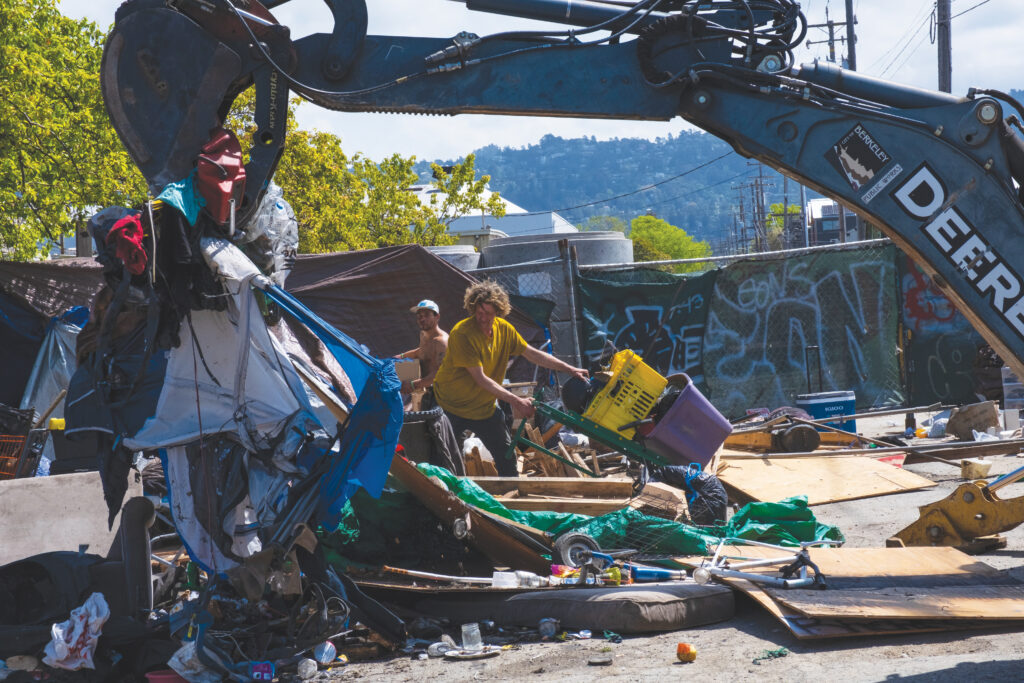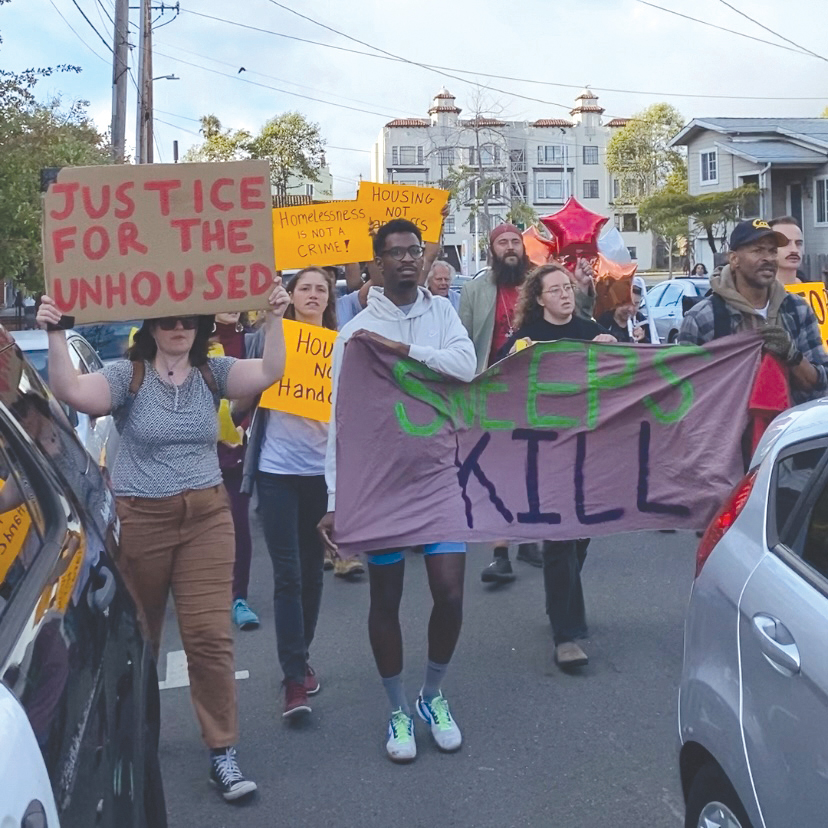
The city has laid out six circumstances when it can sweep and displace residents without housing. Encampments in West Berkeley meet all six conditions.
Berkeley can now sweep some homeless encampments without offering residents alternate housing if city officials determine that the encampment is a hazard or public nuisance, based on a new policy the Berkeley City Council approved in September.
Berkeley became one of the first jurisdictions in the Bay Area to pass an encampment policy after a U.S. Supreme Court ruling in June that gave cities nationwide the power to sweep encampments and enforce criminal penalties without offering temporary housing. Berkeley’s policy doesn’t adopt this ruling in its full capacity, but creates six exceptions when the city can close an encampment and evict residents without an alternate housing offer.
The policy, authored by West Berkeley Councilmember Rashi Kesarwani and Berkeley Hills Councilmember Susan Wengraf, includes cases when city departments determine that the encampment is a fire hazard, an “imminent health hazard,” poses a public nuisance, is located on a public roadway “in dangerous proximity to traffic,” is located in an area where the city has authorized construction work, or would interfere with utility repairs and maintenance.
In these cases, when the city has determined that they can’t make a shelter offer, or the offer won’t be accepted, residents can also be cited or arrested for violating any laws during the sweep. The new policy also allows the City Manager’s office to make changes to sidewalk regulations (which include the infamous “3×3 Ordinance” for storing possessions) without coming before the City Council for approval.
The Harrison Street encampment and the Second and Cedar encampment, among others in Districts 1 and 2, meet all six exceptions and will be prioritized for closure, according to the policy.
The near-unanimous decision came after three hours of public comment—with a vast majority opposing the policy, headed by local homeless advocates and activists. Councilmembers said they received dozens of letters from business owners and housed neighbors in support of the item—especially with regard to encampments in West Berkeley. Ultimately, Southside District 7 Councilmember Cecilia Lunaparra was the sole vote against the policy, saying she was “disturbed and heartbroken” by the text.
Berkeley did not have an explicit encampment policy before September’s resolution, but Martin v. Boise, the previous federal law, said cities could not punish homeless people for sleeping outdoors if housing wasn’t available. That was overruled by the SCOTUS decision in City of Grants Pass vs. Johnson on June 28.
Earlier this summer, Lunaparra and West Berkeley Councilmember Terry Taplin brought forth a resolution to protect the rights of homeless people against the Grants Pass ruling, which would impose no additional restrictions or criminal penalties on unhoused individuals if shelter space was unavailable, and would prioritize the construction, repurposing, and offer of non-congregate shelter and permanent housing “whenever possible.” The resolution failed by one vote.
The city says it still stands by its “Housing First” policy, which Kesarwani reiterated at the meeting, with regard to both congregate and non-congregate housing options. But advocates are stressing that it is cruel to create more opportunities to displace homeless residents in a housing ecosystem where the need for housing far outweighs the availability of both temporary and permanent lodging.
Peter Radu, who leads the city’s homeless response team for the City Manager’s office, said during the meeting that the availability of shelter beds varies by the hour, but there were currently 15 congregate beds available and only five congregate beds in the city. By contrast, 445 individuals are currently living unsheltered in Berkeley, according to data collected during Alameda County’s 2024 Point-in-Time count.
Homeless union says it will bring a lawsuit against the city if enforcement actions are carried out
Yesica Prado and Gordon Gilmore, officers of the newly created Berkeley Homeless Union—which organized a protest march to the meeting—spoke adamantly against the enforcement policy, saying it would worsen the dangerous conditions that Berkeley’s homeless residents currently face on the streets.
They presented a seven-step plan for the city to collaborate with the union on encampment issues, including creating sanctuary spaces for unhoused people, ensuring access to medical and mental health resources, preserving existing networks of homeless residents—instead of displacing them in sweeps—and prioritizing shelter options that allow people to keep their pets.

“Homelessness is not a crime—it is a symptom of deeper systemic failures related to housing affordability, economic inequality, and social safety nets,” the union wrote in their cease and desist letter to the council. “Criminalizing unhoused individuals only perpetuates the problem and pushes people further away from the stability they need to rebuild their lives. Berkeley can lead by example and show the world that it is possible to address homelessness in a compassionate, effective, and just way.”
The union intends to pursue legal action in federal court if the city does not respond affirmatively to their letter in two weeks, and Prado and Gilmore said they would name City Councilmember Rashi Kesarwani —who authored the policy—as a defendant.
Rev. Drew Payton, a pastor at First Presbyterian Church of Berkeley, said he and other service workers have already seen the consequences of the closure of People’s Park, and the resulting displacement of homeless residents. He said he’s deeply concerned about a resolution that criminalizes homelessness.
“The six exceptions of the policy are so broad that they render meaningless the promise to create viable pathways to safe and dignified housing before perpetuating the violence of forcible displacement and destruction of property and the violation of civil rights,” Payton said. “I’m just really worried. These are not hazards or nuisances or obstructions we are talking about, they are human beings and beloved children of god. We have no right to push them aside.”
Payton was among dozens of homeless advocates and workers who said the possibility of sweeps without housing, even as a last resort, would distance them from their clients and prevent healthy outcomes for people living on the streets.
West Berkeley business owners sue Berkeley for “public nuisance” encampments
Interspersed throughout public comment were also business owners, many of them centered in West Berkeley and Downtown, who said the city needed tools to shut down problematic and hazardous encampments that were causing hygiene and safety issues.
Two representatives from the Berkeley Repertory Theater spoke in support of the policy, noting that a fire on August 28 near the encampment at Eighth and Harrison streets melted part of the fence that surrounds their administrative building.
Advocates, including Prado, countered that unhoused residents in the area put out the blaze themselves while waiting an extended period of time for emergency officials to respond to the scene. Additionally, she said the Berkeley Fire Department promised unhoused residents in the area fire education classes in 2023, but the city has not yet fulfilled the promise.
Business owners also noted issues of rodents, excess trash, substance use, and sexual violence occuring nearby, echoed by other neighbors and residents who spoke in support of the policy.
The city is currently being sued by a group of business owners over the condition of encampments at Harrison Street, Codornices Creek, and Dwight Way, which they say present a public nuisance. Covenant Winery, Fieldwork Brewery, the owner of Boichik Bagels, and Bavarian Professionals auto shop are among the plaintiffs in the suit.
Oakland, San Francisco carrying out enforcement actions after Grants Pass
Berkeley’s resolution came weeks before Oakland Mayor Sheng Thao issued an executive order to close homeless encampments that pose an emergency in the city, even if shelter or housing is not available. Oakland’s 2020 Encampment Management Policy divided the city into low- and high-priority zones for sweeps, but typically required shelter offers before a closure—except in the case of an emergency.
Thao’s order on September 23 expands the definition of emergencies, and says, “in no case will emergency or urgent closures be delayed for shelter unavailability.” The city is allowed to make notice to residents 72, 24, or less than 12 hours before the sweep, depending on urgency as deemed by the city.
Oakland had already begun a major sweep at Martin Luther King Jr. Way and 23rd Street a week prior to Thao’s order, resulting in multiple arrests. Prado, reporting at the scene in her capacity as a journalist, was arrested, cited, and released for violating the city’s “Safe Work Zone” ordinance. The ordinance allows the city to arrest anyone who is within the boundaries of a fenced-off area in a work zone, like an encampment closure.
Andrea Henson, executive director of Where Do We Go?, said the regional enforcement actions pose a grave threat to homeless residents. In Berkeley, she said the city needs to focus on reviving services for homeless residents, like mental health outreach clinicians to speak to people living on the street.
At Berkeley’s September meeting, she sang “Amazing Grace” to the councilmembers seated on the dais, explaining that the song was a eulogy to the people whose lives would be disrupted, and ended, by the imminent sweeps and rule changes.
Before the item passed, she said Berkeley had the opportunity to do things differently and be a model for homeless policy that is compassionate to its residents.
“We are the home of the Free Speech Movement…we are the home of Black Panthers and People’s Park and coming up with new opportunities, doing things differently. These business owners, we need to help them by doing things differently,” Henson said. “Everyone else in the country has swept, has pushed. Let’s help those on our streets. Otherwise, the Berkeley that we stand for…this is the beginning of the end, this is the death of Berkeley.”
Supriya Yelimeli is a journalist from Fremont, California. She was formerly a homelessness and housing reporter at Berkeleyside, and has reported on local news in the Bay Area since 2018.
